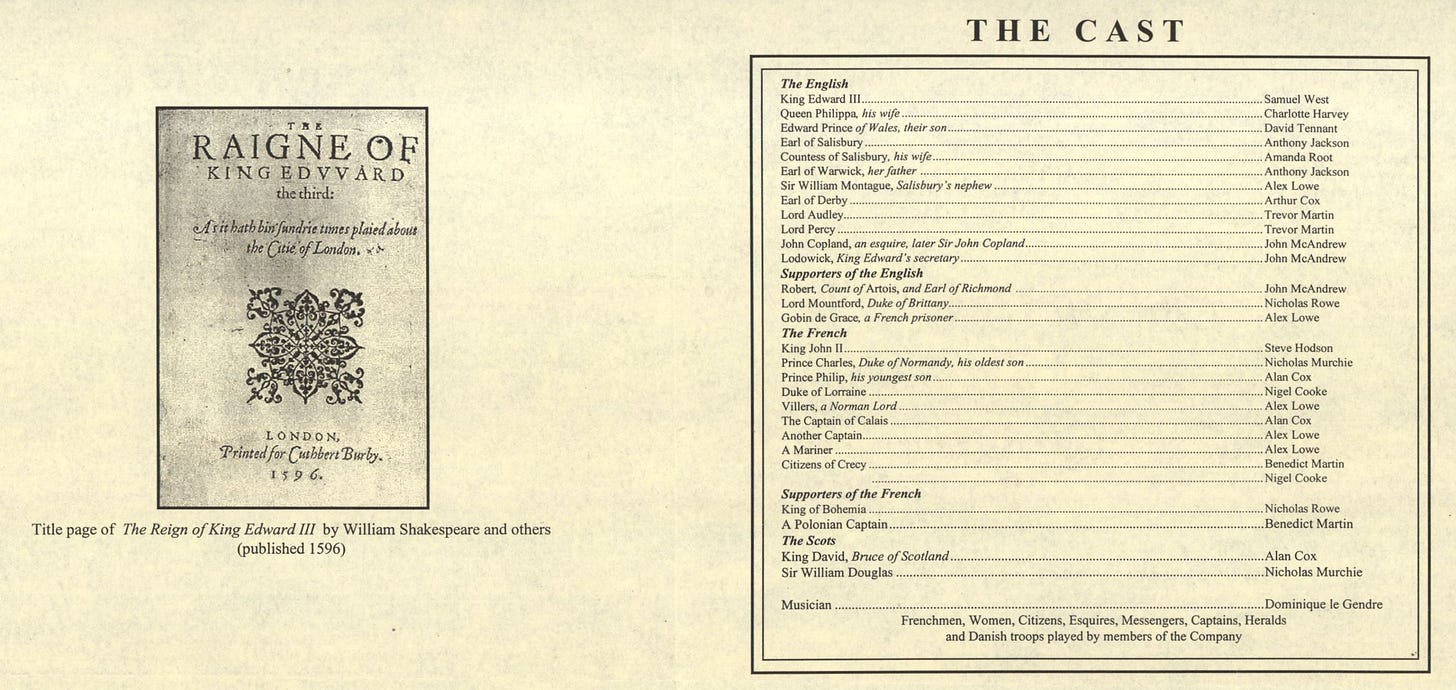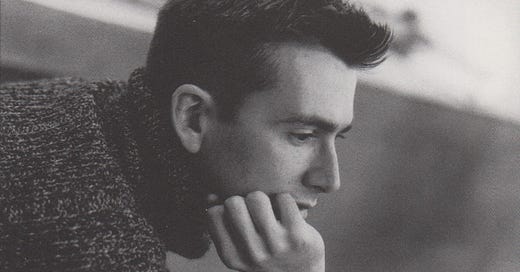The 'Read Not Dead' Series, Pt. 1: David Tennant, Staged Readings at The Globe, and 'Edward III' (1999)
A lot of you are aware that for the better part of a decade I’ve done research on David’s early Scottish theatre work (80s/90s). I’ve found a ton of info and am in slooooow development on a podcast aimed at sharing my discoveries.
But not all my research lands squarely in those years. I’ve learned about plenty of DT’s theatre projects which fall outside of the years my podcast covers. So it occurred to me - since I’m not planning to do a podcast about those years, why not share some interesting tidbits?
Let’s dive in!
By January of 1999, David was living in London and beginning a two-month run at the Almeida’s Albery Theatre as Pavel in Vassa (a comic portrait of a powerful iron-willed matriarch who sees her family destroyed by the very values that she seeks to preserve.) So he was busy, yes? Not busy enough, apparently, because he agreed to join thirteen other actors to do a one-off staged reading of a play often attributed to Shakespeare as a co-writer - called Edward III.
Edward III was part of a series of performances the Education Department of Shakespeare’s Globe Theatre had been doing since the early 1990s called Read Not Dead (heretofore referred to as RND).
Their website has this to say about their mission:
“Read Not Dead is a multi-decade project run by Shakespeare’s Globe, one in which we plan to perform every single ‘unknown’ play that has survived in print, from the accession of Queen Elizabeth I in 1558, to the closing of the theatres in 1642. Some plays from history deserve to be read, not dead.”
(By the by, RND is still active today! I encourage you to read more about their mission and the plays they’ve performed by going to the Read Not Dead website.)
Performing in an RND play was a unique challenge for an actor. RND performances were staged readings, so actors didn’t do the traditional rehearsals. Instead, they received scripts only a few days ahead of the performance.
The project’s website explains it like so:
“The rules of the project have always been simple, experimental, and completely unique. Whilst approaching one individual play, the group does so within one single day. In the morning, the company meets for the first time and throughout the day they work with a Director and experiment with props and costume. Often music is also composed within the short time-frame, too. By the afternoon, the play is put up on its feet and presented as a script-in-hand performance to a live audience.”
Additionally, most RND plays were performed on Sundays (as traditionally this was the only day off for most performing actors in the theatre circuit. This made the full day’s preparation possible.)
These challenges almost certainly appealed to David for a number of reasons: 1) it was a one-off performance with a tight schedule, 2) we all know how he feels about Shakespeare, and 3) the Globe! When an opportunity came for him to play a role in or around that great structure, certainly one imagines he sprung at the chance!
So on 21 February 1999, David played the role of Edward, Prince of Wales (aka the Black Prince) at the Globe Theatre Education Centre/Inigo Jones Theatre. The performance was on a Sunday - that day, the group met at 10a for a run-through, and at 3p they went onstage. It was directed by Clive Brill (who - fun fact - has since worked with David on many things, including the radio dramas The Order of Release, The Island, Murder in Samarkand, The Purple Land, and the two part Afternoon Play series Stevenson in Love).
Now for a treat. Want to see a page from the programme? Ask, and ye shall receive! (Thanks and credit to the Shakespeare’s Globe Archive for the digitized programme, which you can see in further detail here.)

This performance was recorded, and I’ve actually listened to it! (sadly, the audio is only of the first two acts - for some reason, Acts 3 and 4 are missing.) I found it quite well done, especially considering the short amount of time the company of actors had to rehearse.
You, too, can listen to the recording of the performance and others from the series, as the recordings are archived in the Globe Archive and Library in London. Access to the archive is available by appointment only, for professionals and academics affiliated with institutions of higher education.
Now…some astute DT fans might be aware that while Edward III was the first time DT worked with the RND project, it wouldn’t be his last. Very true! He was to go on and work with the project three more times.
We’ll explore those in more detail in future posts.





